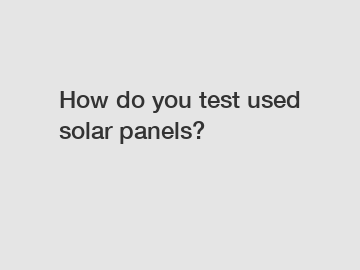How do you test used solar panels?
Intro:
Solar energy is rapidly gaining popularity as a sustainable and cost-effective source of power. With the increasing demand for solar panels, more and more people are turning to the used solar panel market to enjoy the benefits of solar energy without breaking the bank. However, when purchasing a used solar panel, it is essential to ensure that it functions optimally. In this blog, we will explore how to effectively test used solar panels to guarantee their reliability and efficiency.
1. Visual Inspection:

Before diving into the technical aspects, conducting a thorough visual inspection of the used solar panel is crucial. Look for any physical damage, cracks, or discoloration on the surface. Pay close attention to the connections, wiring, and junction boxes for signs of wear or deterioration. Additionally, inspect the frame for rust or any indications of moisture penetration.
2. Measurement of Open Circuit Voltage (Voc):
An important parameter to assess the performance of a solar panel is its open circuit voltage (Voc). Using a suitable multimeter, measure the voltage across the positive and negative terminals of the solar panel with no load connected. Compare the obtained voltage with the manufacturer's specified value. A significant deviation could indicate a problem with the panel's cells, connections, or diodes.
3. Measurement of Short Circuit Current (Isc):
Similarly, measure the short circuit current (Isc) of the solar panel by connecting the positive and negative terminals with a suitable ammeter. This test will allow you to determine if the panel is capable of delivering the expected current in a short circuit condition. Any significant deviation from the specified Isc may indicate cell damage or connection issues.
4. Insulation Test:
To check the integrity of the solar panel's insulation, perform an insulation test using a digital insulation tester. This test is crucial for identifying any potential leakage current or shorts within the panel. A high-quality used solar panel should exhibit excellent insulation resistance and minimal leakage.
5. Temperature Coefficient Test:
Solar panels are designed to operate under various temperature conditions. The temperature coefficient of a solar panel measures how its performance is affected by temperature variations. By using a temperature sensor and carefully controlling the panel's temperature, you can evaluate its efficiency under different temperature conditions. A reliable solar panel will have a minimal temperature coefficient, indicating consistent output regardless of temperature fluctuations.
6. I-V Curve Measurement:
One of the most comprehensive tests for a solar panel is the I-V curve measurement. This test provides insight into the relationship between the voltage (V) and current (I) generated by the panel across different load conditions. Plotting the I-V curve allows you to observe the panel's maximum power point (MPP) and verify if it adheres to the manufacturer's specifications. Contrasting the actual curve with the expected curve will help identify any deviations caused by cell degradation, shading, or internal faults.
Conclusion:
Purchasing used solar panels can be a smart investment, but ensuring their reliability and efficiency is crucial. By following these testing methods, you can confidently evaluate the performance of a used solar panel before making a purchase. Remember, it is always recommended to consult a professional or seek the assistance of a qualified technician when performing these tests for accurate results. Investing in properly tested solar panels will not only save you money but also allow you to contribute to a greener future powered by renewable energy.
For more solar inverter manufacturers, solar power inverter manufacturers, single vs 3 phase inverterinformation, please contact us. We will provide professional answers.
171
0
0


Comments
All Comments (0)